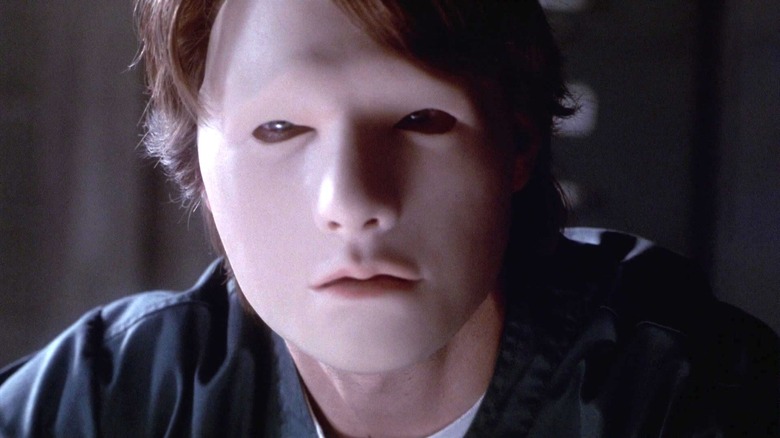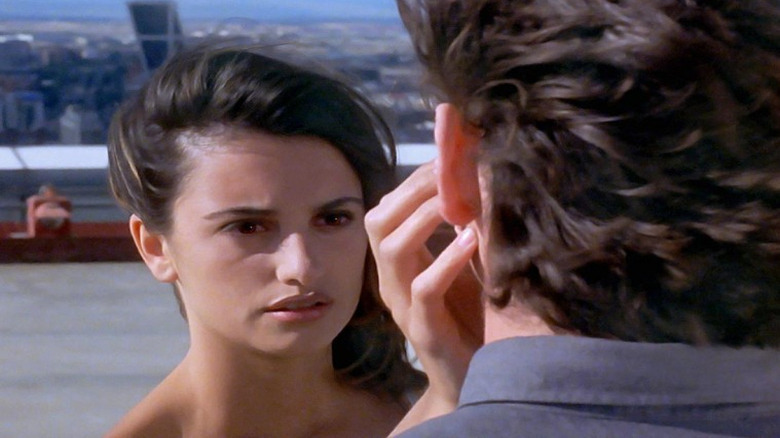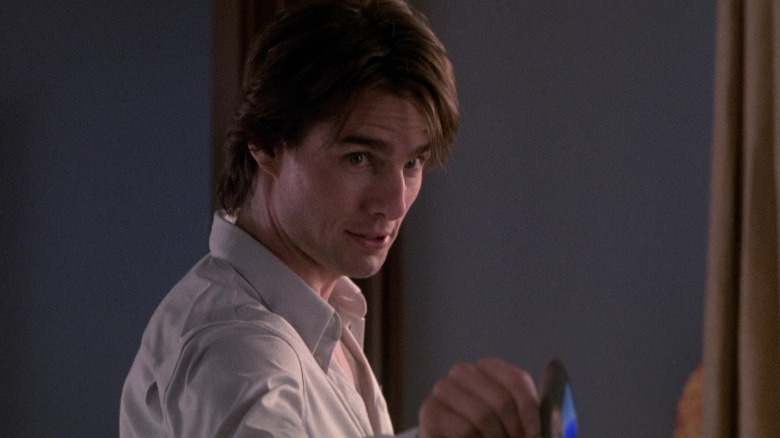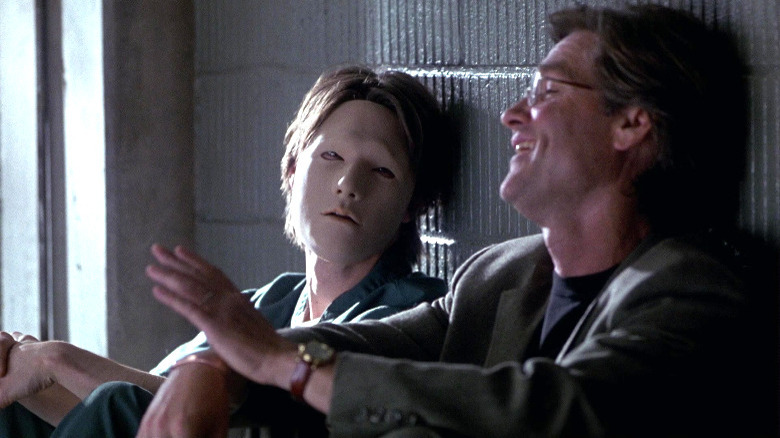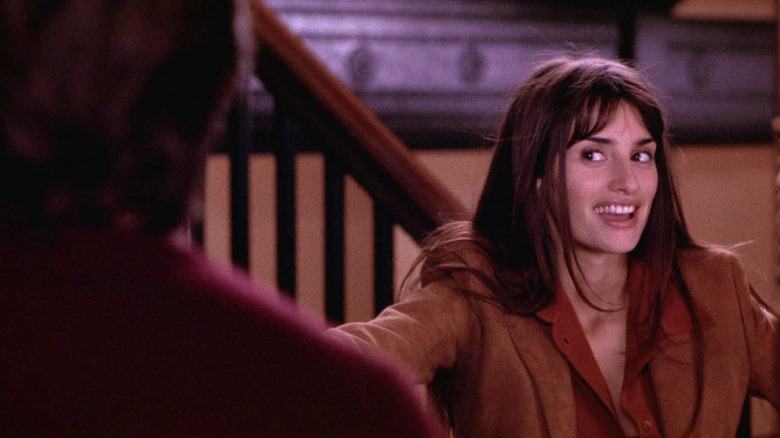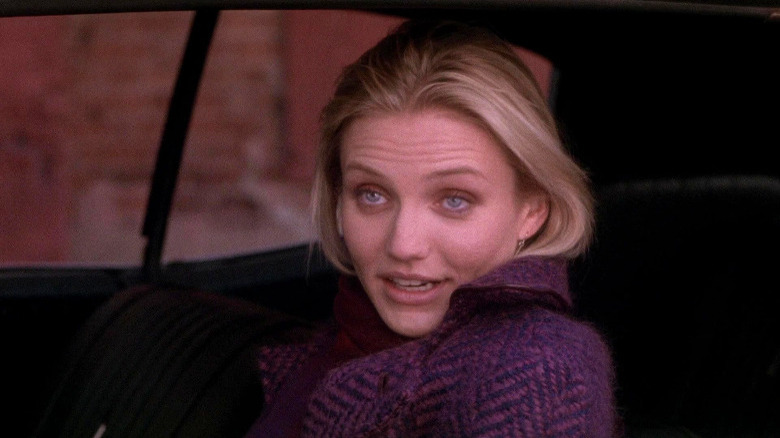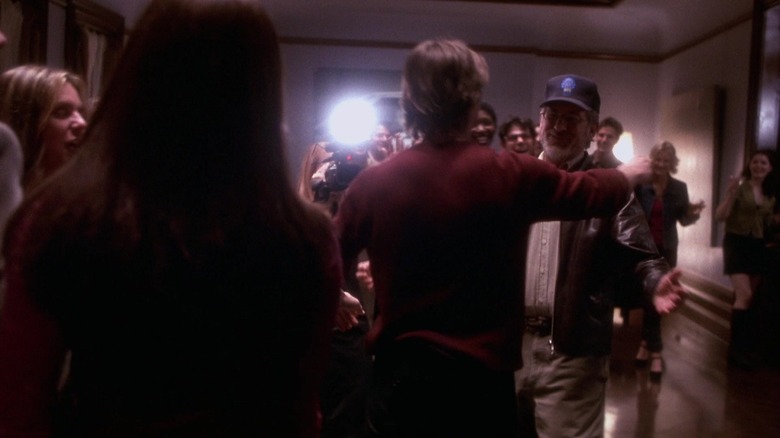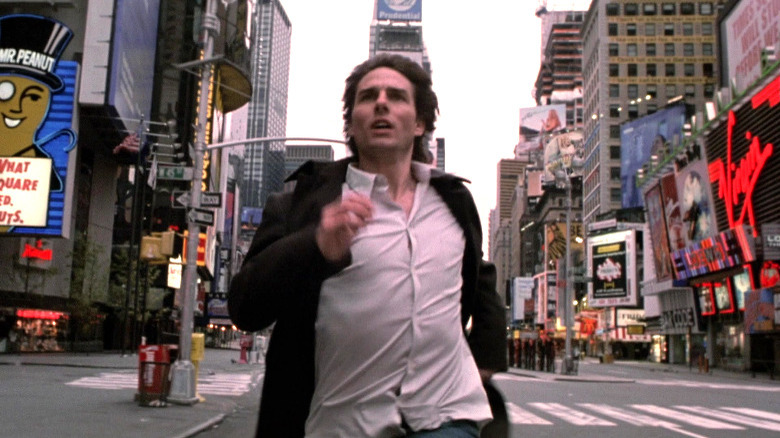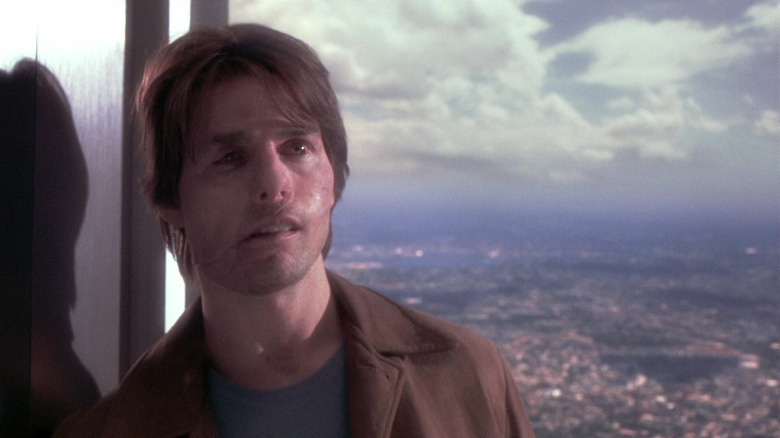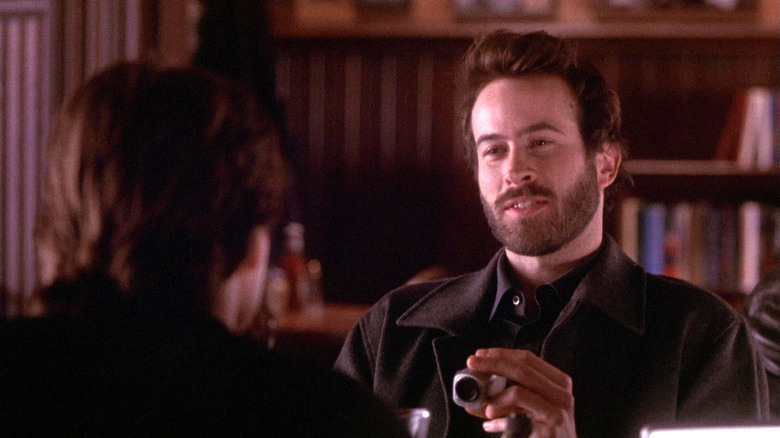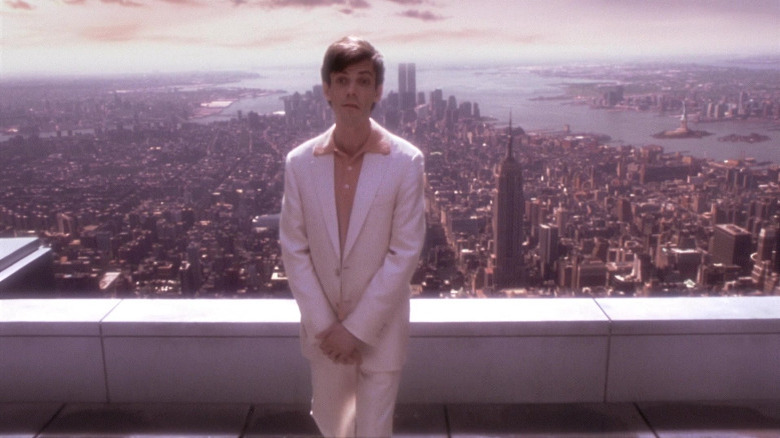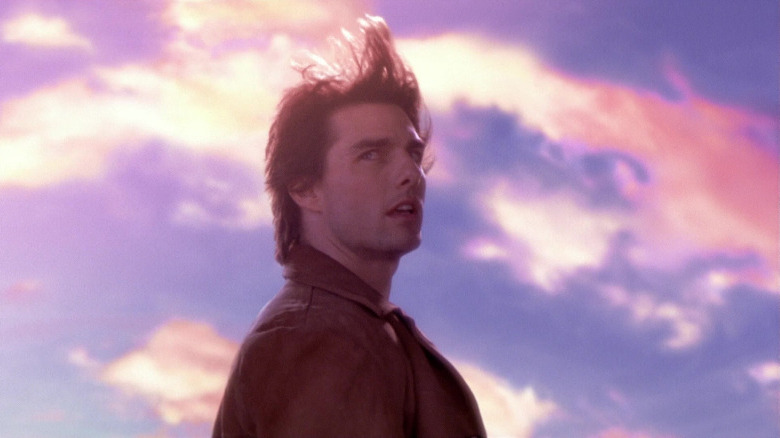The Untold Truth Of Vanilla Sky
Released in the United States on December 10, 2001, "Vanilla Sky" is a tragically beautiful and surreal story about a man who's been living the dream his entire life, but now he's finally waking up and finding the process to be more difficult than you'd typically imagine. It stars Tom Cruise as protagonist David Aames, a publishing magnate who never knew real love before meeting Sofia (Penélope Cruz), a dental assistant with the kind of simple life he could never attain.
Following a car wreck caused by jilted lover Julie (Cameron Diaz), David becomes disfigured. Without his good looks, he finds it difficult to believe that anyone would want to be with him, and he ruins his social and professional life. Things only get more complicated and poignant from there as the film slides into the realm of science fiction that perfectly encapsulates everything incredible about the story while still sneaking up on you.
After two decades, the public has had a chance to reconsider writer-director Cameron Crowe's divisive masterpiece (based on the 1997 film "Abre Los Ojos") and finally appreciate it for the unconventional, big-screen tone poem that it is. To honor that, we'll be exploring some lesser-known behind-the-scenes details you may not be familiar with. So, open your eyes and venture into the untold truth of "Vanilla Sky." Warning — there are spoilers below.
Remixing Abre Los Ojos
In the mini-documentary on the making of "Vanilla Sky" called "Prelude to a Dream," Cameron Crowe describes his experience of seeing "Abre Los Ojos" for the first time, saying, "I couldn't get it out of my mind. The movie felt like a folk song to me; part fable, part poem, partly a committed conversation that you'd have with someone late at night, when big ideas flowed easily. I wanted to be a part of that conversation."
The title of the original film translates in English to "Open Your Eyes," and the opening of "Vanilla Sky" begins with a shot over New York City, with the voice of Penélope Cruz saying "abre los ojos" before transitioning to "open your eyes." This is an obvious reference to the original film. Not only does "Abre Los Ojos" begin the exact same way (in a different location and without the English), but speaking the original film's title is almost a way of acknowledging what came before, then shifting into something new.
Both films are very similar. Obviously, the subject matter is the same, and the overall structure is the same, but many of the specifics are different. While "Abre Los Ojos" is in many ways a traditional film with a unique narrative, "Vanilla Sky" is a stranger, more personal film. As Crowe is reported as saying on his official website, "Vanilla Sky" is more of a remix than a remake.
Alejandro Amenabar knew Tom Cruise would be in it
When you're telling a story about someone with an unbelievably privileged lifestyle, more money than they could ever know what to do with, and no idea just how many people they touch on a daily basis, you need to cast a movie star like Tom Cruise. "Abre Los Ojos" co-writer and director Alejandro Amenábar knew this long before he had any idea that Hollywood would come around looking to remake it one day.
According to an interview he did with The Hollywood Interview, Alejandro stated as much when describing his reaction to the prospect of Cameron Crowe and Tom Cruise remaking it. He said, "I felt very honored and very excited. Actually, when we were writing the Spanish version, I remember that we thought, 'If this were in America, Tom would play the lead role.'"
However, he did also point out one issue he had with Cruise's look in the film. "My biggest peeve with 'Vanilla Sky' is that when Cruise has the disfiguring accident that is supposed to ruin his life and any possibility of real romance ... he still sort of looks like Tom Cruise but with some scars. Some guys would still be happy looking like that."
A dialogue between two films
In interviews during the promotion of "Vanilla Sky," both Cameron Crowe and Tom Cruise brought up this idea of "Abre Los Ojos" and their film engaging in a conversation. For instance, Cruise told reporter Bobbie Wygant that he was intrigued by the idea of recreating a movie with a new take, similar to theater. "In theater ... you do the plays over and over again. This film, although it was Spanish, it deals in universal themes, and it's not cultural dependent. I also thought it would be interesting to have another version of that and to have the two films have a dialogue with each other."
While also talking to Wygant, Cameron Crowe elaborated some more, saying, "We wanted to honor the original, you know? And change the tone of it at times and expand some of the characters. ... I just figured there's one way to remake a movie, which is to start from scratch. And the other way is to try and be a fan of what made the original great and also start a dialogue with it. Which is what we went for."
This goes along with the idea of "Vanilla Sky" really working as a remix of the original film — taking its concepts and putting them through a new filter and exploring different avenues. In that way, both films are talking about the same subject matter but coming at it from a different direction.
Penelope Cruz put more of herself in Sophia
The character of Sophia almost falls into the trope of the manic pixie dream girl thanks to her quirky behavior and optimism. However, we see enough depth there to suggest a genuine human being beneath. Besides, she literally is a dream girl through most of the movie, so it's understandable. Penélope Cruz played Sophia in "Abre Los Ojos" and was apparently very interested in the idea of playing her again.
While appearing on "Charlie Rose," Cameron Crowe confirmed Cruz's enthusiasm for returning. Rose said, "Even though the character is not the same, Penélope basically plays Sophia in both films and says if you don't cast her in your film, she's bringing over an Uzi and taking you out. Is that about right?" Cameron joked that's why he knew he had to meet her right away.
Perhaps more interesting, though, is the way in which Cruz decided to alter her performance. Crowe described the process of working with her to craft this new rendition of Sophia to ScreenSlam, saying, "There's a lot of Penélope in the character of Sophia in our movie. Penélope was a dancer for 14 years. She lived in New York and had many jobs to keep afloat there. There were some lines in the movie that she thought of. I like that this Sophia was a little like Penélope herself."
Cameron Diaz riveted Crowe
Played by Cameron Diaz, Julie is an integral part of "Vanilla Sky." We first meet her in David's bed. Her excitement over being with him juxtaposed against his barely veiled indifference to her makes it obvious that she has feelings for him that he has no intention of reciprocating. When they meet later, things take a horrific turn as Julie lets him know just how she feels about him taking advantage of her.
It's a difficult part to play. You risk coming across as unhinged and campy when the audience should be seeing you as heartbroken and afraid. As far as Cameron Crowe is concerned, Diaz (who'd just been filming "Gangs of New York" in Italy) pulled it off perfectly. Talking to People during the 20th anniversary of the film, Cameron said, "I just remember those electric blue eyes that matched the car that she drove and her kinetic energy that she brought from Italy."
Crowe believes she pulled not only from all her experience as a performer but the exhaustion of travel to help film the scene where David gets in her car, sealing his fate. "We didn't have a lot of time and what happened was something about the exhaustion of not having the time off and having come straight from Italy, something came out," he said. "She used all of her skill to both use all of her craft, but she also used all of her exhaustion, and it's riveting."
A tale of two cameos
As if you needed more proof that David Aames is incredibly famous in the world of "Vanilla Sky," none other than filmmaker extraordinaire Steven Spielberg shows up in a scene and wishes him a happy birthday. And as it turns out, Spielberg's appearance resulted in a bit of a cameo trade.
Not long after "Vanilla Sky" was released, Spielberg's "Minority Report" — also starring Tom Cruise — hit theaters. In this sci-fi flick, during a scene where Cruise's character is trying to travel on a train without being noticed, a curious passenger reading the newspaper takes an interest in him. This stranger was played by Cameron Crowe. On his website, Crowe discussed the cameo exchange.
"Steven Spielberg came to the 'Vanilla Sky' set one day to visit Tom Cruise, and I urged him to walk into the birthday sequence we were filming," Crowe explained. "He was a big hit, improvised dialogue, stayed a couple hours, and left threatening to put me into 'Minority Report.'" Initially, Spielberg wanted Crowe to play a homeless man. However, he later changed his role to a businessman and sat Cameron Diaz behind him.
They really shut down Times Square
"Vanilla Sky" has the audience questioning reality before they even have a chance to get comfortable in their seats, kicking things off with a dream that perfectly sets the tone for the rest of the film. David Aames wakes up to find New York City is eerily silent. He drives through Manhattan streets that are completely devoid of people. Seeking some semblance of life, he heads to Times Square (a notoriously crowded and noisy place) and doesn't encounter a soul.
Back at the turn of the 21st century, pulling a shot like that off digitally wasn't an option. So they had to actually empty Times Square for real. Cameron Crowe told Vulture that filming that scene in Times Square was always set in stone. All they had to do was get permission and stick to a strict plan. "We started preparing the movie, and very early on, our producers Don Lee and Paula Wagner and Tom Cruise went to see Rudy Giuliani and his people to see if we could do this," Crowe said.
The one condition was Crowe couldn't do as many takes as he usually would because they only had three hours. They planned the shot for weeks, often rehearsing it after filming other scenes. When the day came, it was a strange sight. "It was empty almost as far as you could see. Unbelievable." Everything went off without a hitch, and they even finished shooting early.
Nancy Wilson helped with more than just score
Other than being the guitarist for Heart, Nancy Wilson is also a film composer. During her marriage to Cameron Crowe, she composed the scores for three of his films: "Almost Famous," "Vanilla Sky," and "Elizabethtown." Given her status as a rock icon and his history as a rock journalist, it's easy to see why their professional collaborations were so successful. Wilson gave her own explanation for why they worked so well together to Eric Blair on the red carpet for "Vanilla Sky."
"We really identify with the same stuff musically," Wilson said, "because we're sort of from the same generation ... we communicate in ESP, pretty much." She also admitted that the score wasn't the only musical area of the film that she had a hand in. When asked if she helped pick any of the songs on the soundtrack, she said, "Some of it. I mean, ultimately Cameron had the most killer ideas."
However, according to the soundtrack's liner notes, Wilson and Crowe both wrote a song (with lyrics and everything) for the film called "I Fall Apart" and credited it to Julie, Cameron Diaz's character.
Vanilla Sky's original ending
The ending of "Vanilla Sky" is one of those classic movie endings that can be debated for ages, which was done by design. However, the original ending likely would've resulted in even more discourse, according to Crowe. He told Film School Rejects that because production on the film happened so quickly, they didn't have time to question things — they just went for it. After showing the film to test audiences, they decided to trim to ending down and make it a little more streamlined.
"It's a different version of the same ending, but it's a little more challenging and less is explained," Crowe said. "You want people to understand what you're going for, so the question is, looking at both endings: Did the pendulum swing too much in the direction of us explaining stuff? I think it did."
When watching the original ending, you can see how different it was. In the theatrical version of the film, David learns about his dream, has a mini-meltdown, and is greeted by tech support in the form of Edmund Ventura (Noah Taylor). Originally, the meltdown continued and escalated to such a degree that David would have a shoot-out with the security guard played by Michael Shannon. It's a wild clash of tones that doesn't quite solidify. The version we got back in 2001 is still ambiguous, but everything is more focused. There is a quiet acceptance to it that eases the audience into these heady ideas.
Crowe's secret theory
Although the film's ending was augmented to give the audience a clearer understanding of what's happening, it still leaves plenty of questions for curious viewers to chew on. If taken literally, the movie is split in two: David Aames' life before the car wreck and his unnaturally prolonged dream afterward. Then again, you could also see it as one long dream from beginning to end. Sophia never existed, there was no wreck, no Life Extension — just one guy struggling with the demons hiding in his subconscious.
On the commentary for the film, Cameron Crowe isn't interested in providing a definitive answer. To him, the questions are the interesting part. He does, however, offer a few possible interpretations — including a personal one of his own involving Jason Lee's character, Brian.
If you've seen the film, then you remember that Brian is a struggling writer who sometimes yearns to live David's life. In Brian's view, the drawback to David's existence is that he's never experienced heartbreak and pain. In that way, he's never known true love. Throughout the movie, Brian explains that the sweet things in life ain't as sweet without the sour, but David doesn't understand what he means until the end. Cameron's "secret" interpretation is that "Vanilla Sky" is Brian's book, and he wrote it to show David what true love feels like.
The 9/11 effect
We can theorize about why "Vanilla Sky" was so divisive at the time, but chances are it would've split critics and audiences regardless of its release date. Delving into the nature of life through the subconscious isn't something general audiences are too keen on, and some critics are so caught up in the "rules" of storytelling that the film never would have connected with them. That's not to say, however, that its release date had no effect on the audience's reaction.
While talking to Film School Rejects, Crowe pointed out that he thought seeing the film so soon after the terrorist attacks on 9/11 bothered some people. If you recall, the ending of the film takes place atop a skyscraper overlooking Manhattan. Just over Edmund's shoulder, the Twin Towers (which were destroyed in the attacks) are clearly visible. Of their inclusion, Crowe said, "There was a big discussion about taking them out, but my feeling was we shouldn't destroy them again, they should be there, and live on."
Also, the fact that one of the last images of the film is of a man leaping from a building made people feel a mix of emotions. "The days right after 9/11 when we were showing the movie," Crowe said, "when Tom jumps off that building, you could feel the wave go over the audience. People were electrified, whether positive or negative. That was kind of amazing."
Vanilla Sky is not the movie you think it is
The marketing for "Vanilla Sky" didn't exactly give audiences a clear picture of what to expect when walking into theaters back in 2001. Watching the theatrical trailer now is baffling, as it chose to focus primarily on the film's opening act, making it look like a thriller about a jealous woman. Cameron Crowe said the marketing made the film look like a "Fatal Attraction" kind of story when talking to Vulture.
The marketing was so misleading that, according to Crowe, a movie theater employee told patrons to get a refund before the movie starts. "The opening weekend, I went to see it, and there was a guy roaming the aisles, saying, 'This is not the movie you think it is. If anybody needs a refund now, ask for a refund.'" Crowe described him as an upper-management guy and remarked on how stunned he was to see this.
I was like, "How do you know what movie they think it is?" It was traumatic. ... I was like, 'You could turn this into a plus, you know. You could make it a wonderful assignment for a wonderful audience to wrap their heads around.' But ... no." To be fair, while the guy's actions were rude and uncalled for, his statement was probably right.
